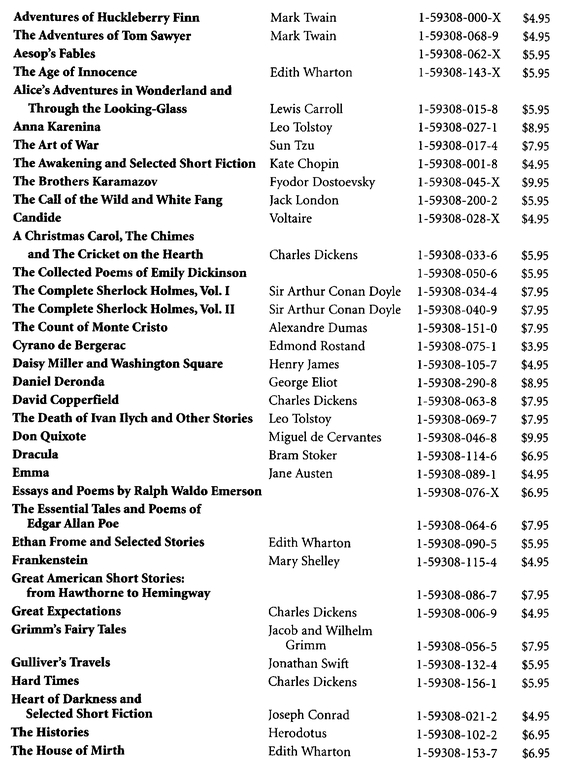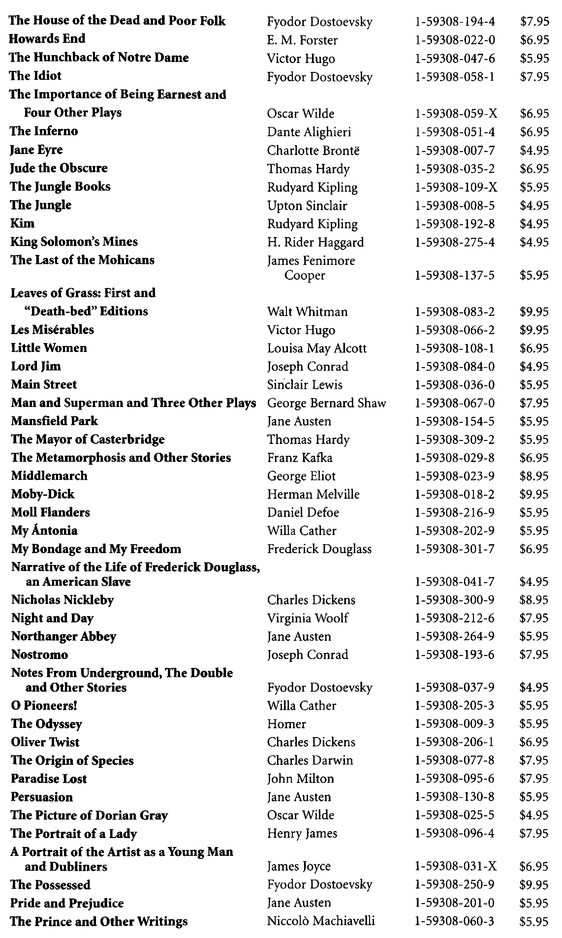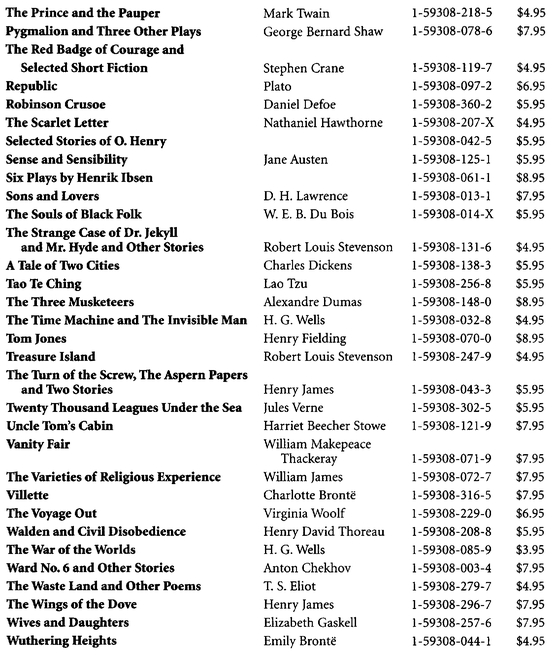Deerslayer (Barnes & Noble Classics Series) (91 page)
Read Deerslayer (Barnes & Noble Classics Series) Online
Authors: James Fenimore Cooper

BOOK: Deerslayer (Barnes & Noble Classics Series)
3.89Mb size Format: txt, pdf, ePub
FOR FURTHER READING
Other Works by James Fenimore CooperPrecaution (1820)
The Spy (1821)
The Pilot (1823)
The Pioneers (1823)
Lionel Lincoln (1825)
The Last of the Mohicans ( 1826)
The Prairie (1827)
The Red Rover (1827)
Notions of the Americans (1828)
The Wept ofWish-ton-Wish (1829)
The Water-Witch (1830)
The Bravo (1831)
The Heidenmauer (1832)
The Headsman (1833)
The Monikins (1835)
The American Democrat (1838)
Homeward Bound (1838)
Home as Found (1838)
The Pathfinder (1840)
Satanstoe (1845)
The Chainbearer (1845)
The Redskins (1846)
Bibliography and ReferenceDyer, Alan Frank. James Fenimore Cooper: An Annotated Bibliography of Criticism. New York: Greenwood Press, 1991.
MacDougall, Hugh C. Where Was James? A James Fenimore Cooper Chronology from 1789 to 1851. Cooperstown, NY: James Fenimore Cooper Society Miscellaneous Papers, no. 3, second printing, January 1998.
. Cooper and Cooperstown: A Chronology and Bibliography. Cooperstown, NY: James Fenimore Cooper Society, 1999.
Spiller, Robert E., and Philip C. Blackburn. A Descriptive Bibliography of the Writings of James Fenimore Cooper. 1934. New York: Burt Franklin, 1968. Bibliography of early Cooper editions.
Summerlin, Mitchell Eugene. A Dictionary to the Novels of James Fenimore Cooper. Greenwood, FL: Penkevill, 1987.
Walker, Warren S. Plots and Characters in the Fiction of James Fenimore Cooper. Ham-den, CT: Archon Books, 19 7 8 .
BiographyGrossman, James. James Fenimore Cooper: A Biographical and Critical Study. 1949. Stanford, CA: Stanford University Press, 1967.
Long, Robert Emmet. James Fenimore Cooper. New York: Continuum, 1990.
Lounsbury, Thomas R. James Fenimore Cooper. 1883. New York: Chelsea House, 1981.
Railton, Stephen. Fenimore Cooper: A Study of His Life and Imagination. Princeton, NJ: Princeton University Press, 1978.
Wallace, James D. Early Cooper and His Audience. New York: Columbia University Press, I986.
Letters, Correspondence, and a MemoirBeard, James Franklin, ed. The Letters and Journals of James Fenimore Cooper. 6 vols. Cambridge, MA: Harvard University Press, 1960-1968.
Cooper, James Fenimore [grandson], ed. Correspondence of James Fenimore Cooper. 2 vols. New Haven, CT: Yale University Press, 1922.
Cooper, Susan Fenimore [daughter]. “Small Family Memories.” In James Fenimore Cooper [grandson], ed., Correspondence of James Fenimore Cooper, vol. 1. New Haven, CT: Yale University Press, 1922, pp. 7-72.
Literary CriticismClark, Robert. History, Ideology and Myth in American Fiction. London: Macmillan, 1984.
Darnell, Donald. James Fenimore Cooper: Novelist of Manners. Newark, DE: University of Delaware Press, 1993.
Dekker, George. James Fenimore Cooper: The Novelist. London: Routledge and Kegan Paul, 1967.
Franklin, Wayne. The New World of James Fenimore Cooper. Chicago, IL: University of Chicago Press, 1982.
House, Kay Seymour. Cooper’s Americans. Columbus, OH: Ohio State University Press, 1965.
Kelly, William P Plotting America’s Past: Fenimore Cooper and the Leatherstocking Tales. Carbondale, IL: Southern Illinois University Press, 1983.
Peck, H. Daniel. A World by Itself: The Pastoral Moment in Cooper’s Fiction. New Haven, CT: Yale University Press, 1977.
Philbrick, Thomas. James Fenimore Cooper and the Development of American Sea Fiction. Cambridge, MA: Harvard University Press, 1961.
Rans, Geoffrey Cooper’s Leather-stocking Novels: A Secular Reading. Chapel Hill, NC: University of North Carolina Press, 1991.
Ringe, Donald A. James Fenimore Cooper. 1961. Revised edition: Boston, MA: Twayne, 1988.
Suzuki, Taisuke. The Literary World of James Fenimore Cooper: His Works and Their Relation to His Beliefs. Tokyo: Eichosa, 1992.
Literary Criticism: Collected EssaysBakker, J., ed. James Fenimore Cooper Issue: Dutch Quarterly Review of Anglo-American Letters 20:3 (1990). Amsterdam: Editions Rodopi. Papers from the 1989 Bicentennial Conference on Cooper at the University of Groningen in the Netherlands.
Clark, Robert, ed. James Fenimore Cooper: New Critical Essays. London: Vision, and Totowa, NJ: Barnes and Noble, 1985.
Cooper Conference Papers. Papers from the biannual conference on James Fenimore Cooper: His Country and His Art, held since 19 7 8 at the State University of New York College at Oneonta; published by the college.
Cooper Panel Papers. Papers from the Cooper Panel at the annual conference of the American Literature Association, held in San Diego and Baltimore ; published by the James Fenimore Cooper Society (Cooperstown, NY).
Dekker, George, and John P McWilliams, eds. Fenimore Cooper: The Critical Heritage. London and Boston: Routledge and Kegan Paul, 1973.
Fields, Wayne, ed. James Fenimore Cooper: A Collection of Critical Essays. Englewood Cliffs, NJ: Prentice Hall, 1979.
Verhoeven, W M., ed. James Fenimore Cooper: New Historical and Literary Contexts. Amsterdam and Atlanta: Editions Rodopi, 1993.
Walker, Warren S., ed. Leatherstocking and the Critics. Chicago: Scott, Fores-man, 1965.
Politics and Political Views in Cooper’s writingAdams, Charles Hansford. “The Guardian of the Law”: Authority and Identity in James Fenimore Cooper. University Park: Pennsylvania State University Press, 1990.
Cooper, James Fenimore. The American Democrat, or, Hints on the Social and Civic Relations of the United States of America. 1838. New York: Vintage Books, 1956.
McWilliams, John E, Jr. Political Justice in a Republic: James Fenimore Cooper America. Berkeley and London: University of California Press, 1972.
Spiller, Robert E. Fenimore Cooper: Critic of His Times. 1931. New York: Russell and Russell, 1963.
Waples, Dorothy. TheWhig Myth of James Fenimore Cooper. New Haven, CT: Yale University Press, 1938.
William Cooper and CooperstownBirdsall, Ralph. The Story of Cooperstown. 1917. Cooperstown, NY: Willis Monie, 2004. Includes a biographical sketch of the author plus an index by Hugh MacDougall.
Cooper, James Fenimore. The Chronicles of Cooperstown. Cooperstown, NY: H. and E. Phinney, 1838.
Cooper, James Fenimore [grandson]. Reminiscences of Mid-Victorian Cooperstown and a Sketch of William Cooper. Cooperstown, NY: Otsego County Historical Society, Publication no. 1, 1936 (reprinted, Cooperstown: Smithy-Pioneer Gallery, 1986).
Cooper, Susan Fenimore [daughter]. Rural Hours. 1850. London and Athens: University of Georgia Press, 1998.
Cooper, William. A Guide in the Wilderness; or, the History of the First Settlements in the Western Counties of New York, with Useful Instructions to Future Settlers. 1810. Freeport, NY: Books for Libraries Press, 1970.
MacDougall, Hugh C. Cooper’s Otsego County. Cooperstown, NY: New York State Historical Association, 1989. Sites in Otsego County related to James Fenimore Cooper’s life and novels, many described in his own words.
Taylor, Alan. Willam Cooper’s Town: Power and Persuasion on the Frontier of the Early American Republic. New York: Vintage Books, 1996.
TIMELESS WORKS. NEW SCHOLARSHIP. EXTRAORDINARY VALUE.
Look for the following titles, available now and forthcoming from BARNES &, NOBLE CLASSICS.
Visit your local bookstore for these fine titles.




BARNES & NOBLE CLASSICS
If you are an educator and would like to receive an
Examination or Desk Copy of a Barnes & Noble Classic edition,
please refer to Academic Resources on our website at
Examination or Desk Copy of a Barnes & Noble Classic edition,
please refer to Academic Resources on our website at
or contact us at
All prices are subject to change.
a
True essence (French).
b
It is no more than justice to say that the Greenbush Van Rensselaers claim to be the oldest branch of that ancient and respectable family. (Cooper’s note, 1841)
c
Lest the similarity of the names should produce confusion, it may be well to say that the Uncas here mentioned is the grandfather of him who plays so conspicuous a part in The Last of the Mohicans. (Cooper’s note, 1841 )
d
Harry and Natty arrive at the lake on its eastern shore south of Point Judith.
e
Projecting pieces cut out of a piece of wood that are fit into the mortises (slots or grooves) of other pieces of wood to form joints.
f
Exploit.
g
Inertia (Latin).
h
Totality (French).
i
It is singular there should be any question concerning the origin of the well-known sobriquet of “Yankees.” Nearly all the old writers who speak of the Indians first known to the colonists make them pronounce the word “English” as “Yengeese.” Even at this day, it is a provincialism of New England to say “English” instead of “Inglish,” and there is a close conformity of sound between “English,” and “Yengeese,” more especially if the latter word, as was probably the case, be pronounced short. The transition from “Yengeese,” thus pronounced, to “Yankees” is quite easy. If the former is pronounced “Yangis,” it is almost identical with “Yankees,” and Indian words have seldom been spelled as they are pronounced. Thus the scene of this tale is spelt “Otsego,” and is properly pronounced “Otsago.” The liquids of the Indians would easily convert “En” into “Yen.” (Cooper’s note, 1841)
j
The Otsego is a favorite place for the caravan keepers to let their elephants bathe. The writer has seen two at a time, since the publication of this book, swimming about in company. (Cooper’s note, 1841)
Other books
Forever (Book #3 in the Fateful Series) by Schmidt, Cheri
Texas CHAOS (Texas Heroes Book 2) by Sable Hunter
Judith E French by Highland Moon
Pages of Passion by Girard, Dara
Avenging Alex by Lewis Ericson
Hell Hath No Fury by Rosalind Miles
The Red Parts by Maggie Nelson
Last Message by Shane Peacock
Dorothy Garlock by Homeplace
The Third Person by Steve Mosby
